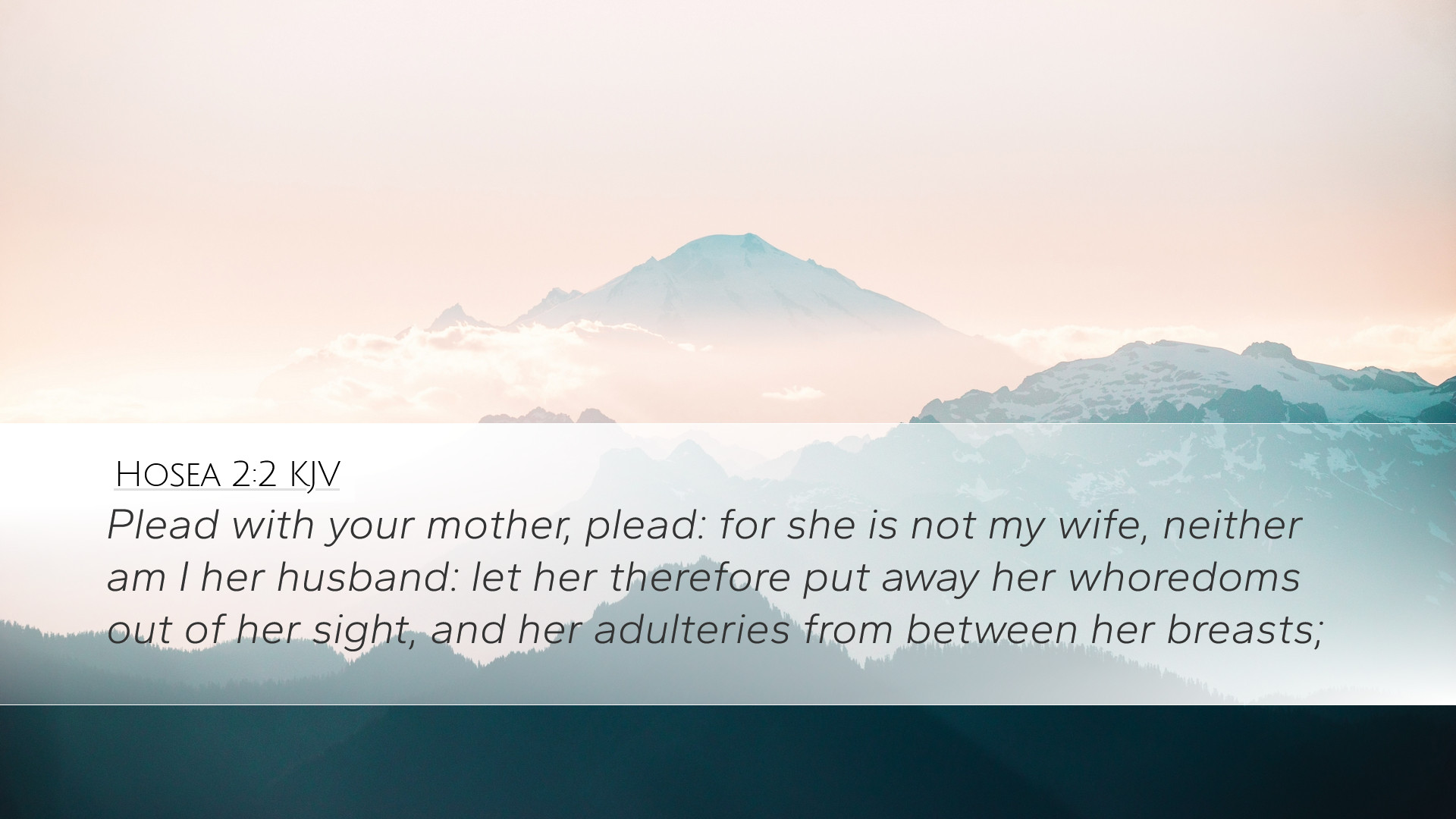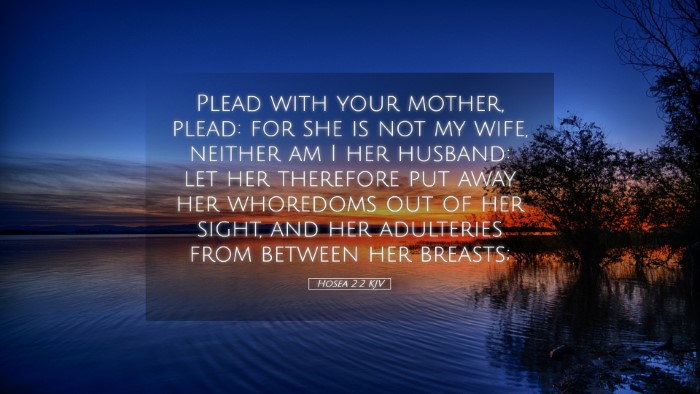Old Testament
Genesis Exodus Leviticus Numbers Deuteronomy Joshua Judges Ruth 1 Samuel 2 Samuel 1 Kings 2 Kings 1 Chronicles 2 Chronicles Ezra Nehemiah Esther Job Psalms Proverbs Ecclesiastes Song of Solomon Isaiah Jeremiah Lamentations Ezekiel Daniel Hosea Joel Amos Obadiah Jonah Micah Nahum Habakkuk Zephaniah Haggai Zechariah MalachiHosea 2:2
Hosea 2:2 KJV
Plead with your mother, plead: for she is not my wife, neither am I her husband: let her therefore put away her whoredoms out of her sight, and her adulteries from between her breasts;
Hosea 2:2 Bible Commentary
Commentary on Hosea 2:2
Hosea 2:2 reads: "Plead with your mother, plead: for she is not my wife, neither am I her husband: let her therefore put away her whoredoms out of her sight, and her adulteries from between her breasts."
This verse encapsulates the heart of God as He calls His people back to Himself. Through the prophetic voice of Hosea, it reveals themes of judgment, reconciliation, and divine love.
Overview and Context
The Book of Hosea is a profound prophetic narrative that depicts the tumultuous relationship between God and Israel, often using marital imagery. Hosea, as a prophet, is commanded to marry a woman of harlotry, symbolizing the unfaithfulness of Israel to God. This relationship sets the stage for understanding God's judgment and mercy.
The Plea for Repentance
Plead with your mother, plead: In this phrase, we see an urgent call for intercession. The metaphorical mother represents Israel, and the repeated call to plead indicates the seriousness of the situation. As Matthew Henry notes, the urgency implies that the time for action is now; it is a reflective plea for Israel to recognize her sinful state.
God's Covenant Relationship
For she is not my wife, neither am I her husband: This stark declaration highlights the broken covenant. Albert Barnes emphasizes that God is distancing Himself from Israel's unfaithfulness. The marriage metaphor is powerful; God views the relationship as one of profound intimacy, and Israel's actions have severed this bond.
The Call for Purification
Let her therefore put away her whoredoms out of her sight: Hosea's call to put away 'whoredoms' signifies a need for repentance and purification. Adam Clarke remarks on the necessity of abandoning idolatry and other sins that have corrupted the relationship with God. It underscores that turning back to God means rejecting all forms of spiritual and moral impurity.
Understanding Spiritual Adultery
The imagery of 'whoredoms' and 'adulteries' evokes strong feelings of betrayal. Both Henry and Barnes discuss the significance of spiritual adultery, noting that Israel’s turning away to other nations and idols is akin to a spouse's infidelity. This analogy not only conveys the gravity of their sin but also God's righteous indignation.
Divine Judgment and Hope
This verse presents a duality of divine judgment and hope. While there is a clear declaration of God's displeasure, there is also an implicit hope for restoration. Clarke posits that the very act of pleading indicates a desire for reconciliation. God's love persists, yearning for Israel to return.
Reflection for Today
For pastors, students, and theologians, Hosea 2:2 serves as a timeless reminder of the nature of God’s love—jealous, passionate, and desiring fidelity. It calls for a deep self-examination of one’s own faithfulness to God. The call for repentance is universal; it extends beyond the Israelite context and remains relevant for modern believers.
- The Importance of Intercession: Engaging in prayer for ourselves and others to remain faithful to God's ways.
- Covenant Relationship: Understanding that our relationship with God is reciprocal, requiring commitment and faithfulness.
- Embracing Purity: Aiming to strip away that which creates distance from God—be it sinful practices or misplaced affections.
Conclusion
Hosea 2:2 offers a profound glimpse into the heart of God—a God who lovingly calls for restoration despite the unfaithfulness of His people. This verse speaks to the essential themes of judgment and hope, serving as a cornerstone for understanding our own relationship with the Divine. Let us heed the call to repentance and embrace the loving invitation to return to our first love.


